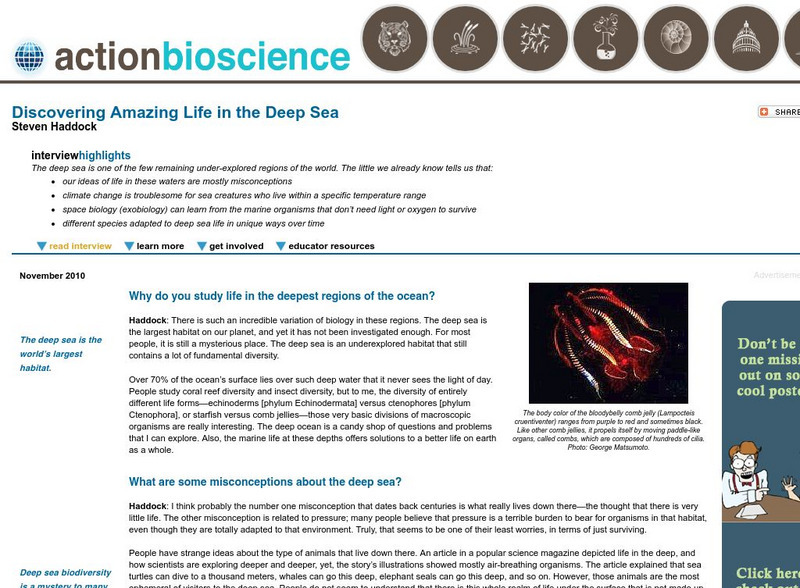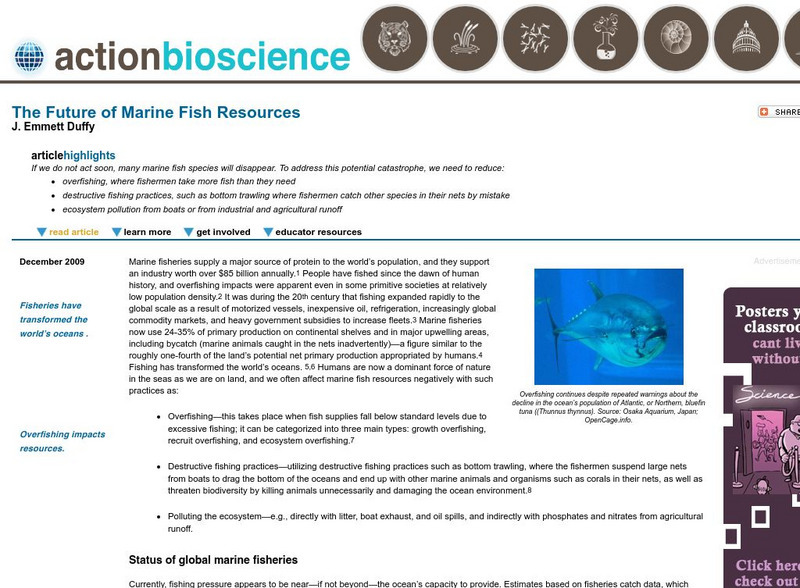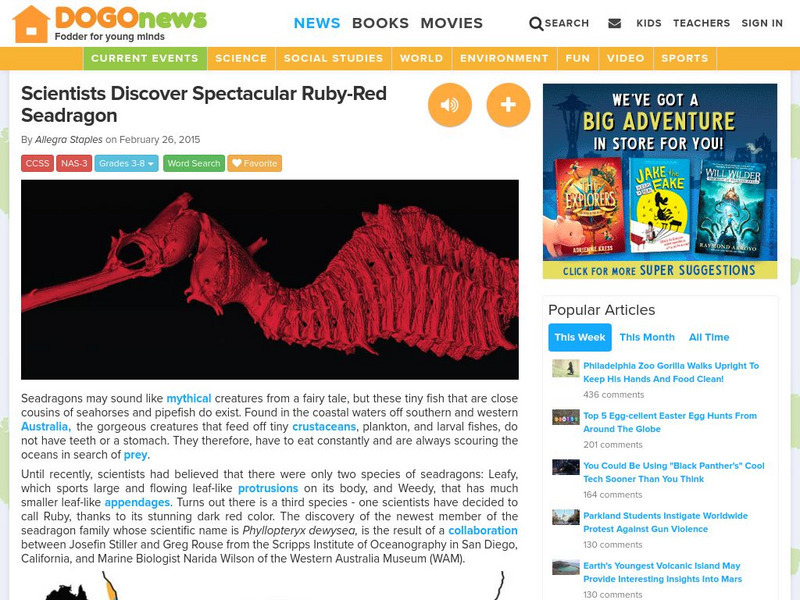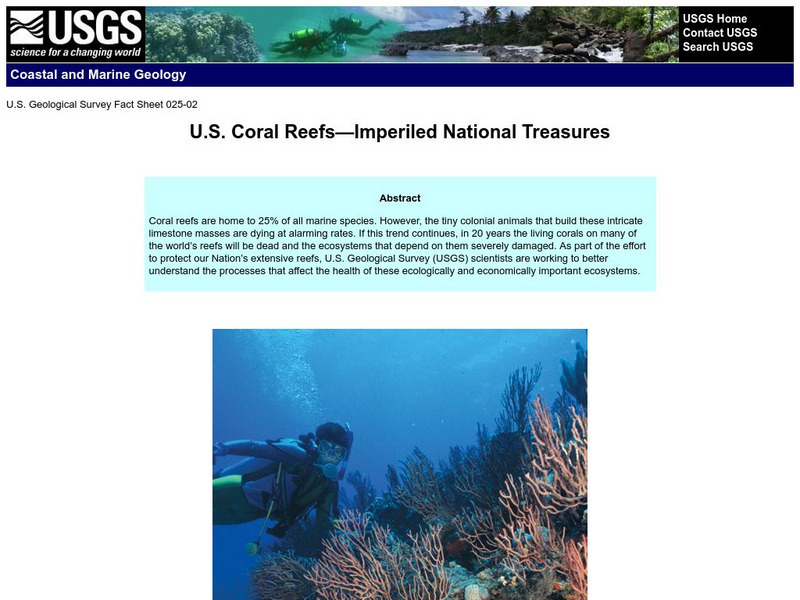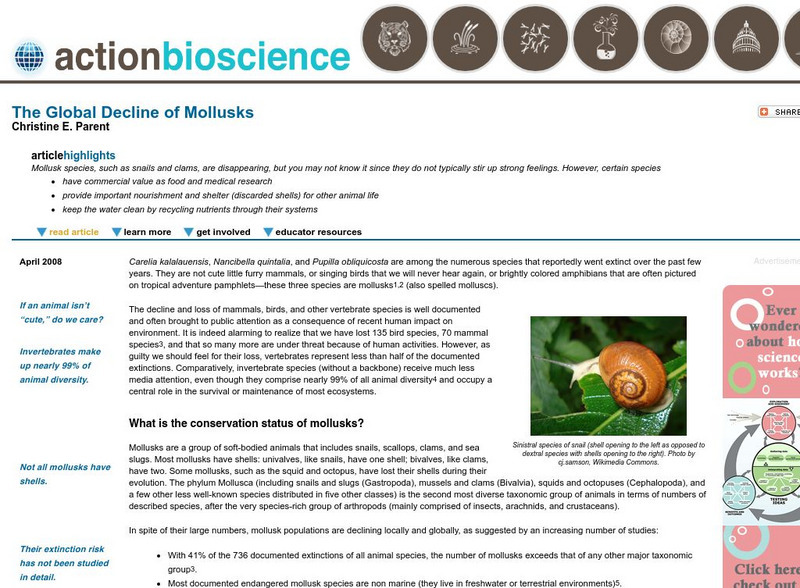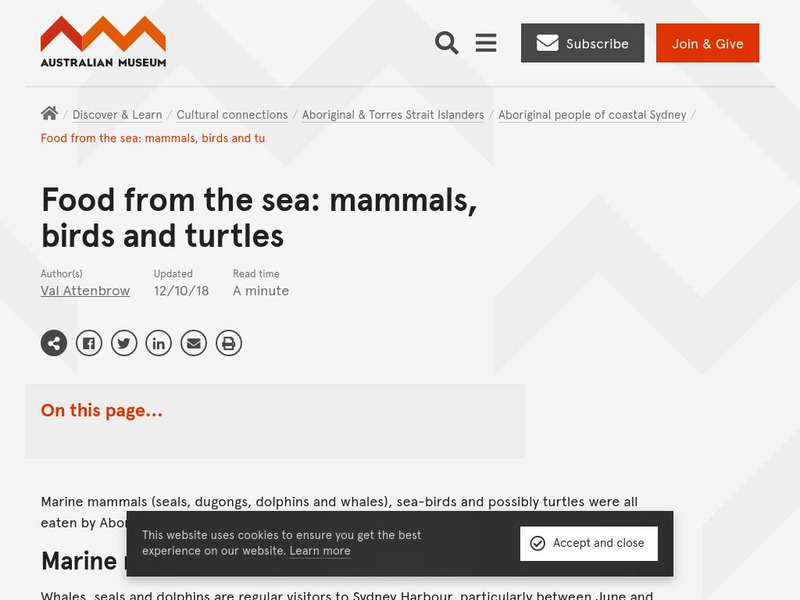NASA
Water Works on a Blue Planet
Keep within a water budget. Learners find out that less than 2.5% of Earth's water is available to drink—and that there is a fixed amount of water. Scholars read an interesting article comparing the available water to a game of Monopoly...
Society for Science and the Public
Science News for Students: Ocean Animals Have Mushroomed in Size
Article reports on the increasing size of ocean animals over the millenia. Includes a list of key vocabulary.
DOGO Media
Dogo News: Tiny Sea Animals May Drive Sea Currents
New research suggests that very tiny sea creatures in very huge numbers may contribute to the movement of the oceans' currents. Debate and more research are still necessary to prove this. Includes video.
Yale University
Yale Environment 360: The Oil Spill's Growing Toll on the Sea Life of the Gulf
Marine biologist Thomas Shirley explains the impact of the Gulf of Mexico oil spill in the short and long term. The total impact is hard to determine at this point of time, however. Shirley gives his best opinion of the damage that...
Other
Vietnam War Commemoration: The u.s. Marine Corps in the Vietnam War [Pdf]
Article celebrating the U.S. Marine Corps and outlining involvement in the Vietnam War.
Other
Canadian Federation of Humane Societies: Marine Mammals in Captivity
An article expressing concern about the use of marine mammals in the entertainment industry.
University of California
Scripps: Interview With Marine Biologist
Do you wonder what the career of a marine biologist is really like? Use the career interview with marine biologist Dr. Michael Latz ti learn more.
BBC
Bbc Newsround: Acid Water Threat to Ocean Life
Article reports on the threat to ocean life due to rising acid levels in water.
Society for Science and the Public
Science News for Students: Sleepless at Sea
Can you go for a month without sleeping? Most mammals can't, but scientists have found some marine mammals that do. Find out why some orcas and dolphins don't sleep for weeks at a time.
American Institute of Biological Sciences
Action Bioscience: Discovering Amazing Life in the Deep Sea
A research biologist at the Monterey Aquarium and a professor at UC-Santa Cruz is interviewed to explain the studies done in the deep sea. Steven Haddock addresses the purpose of uncovering the mysteries of life and environment lying out...
BBC
Bbc: New Marine Life Found in Deep Sea Vents
Six new animal species are identified at deep-sea vents beneath the Indian Ocean. Find out what new creatures are stirring in the sea.
American Institute of Biological Sciences
Action Bioscience: Environmental Impacts of Marine Exotics
Invasive species are disrupting many bodies of water in North America. Scientists share their reasons for concern in this brief article. Supporting and educator resources are provided.
American Institute of Biological Sciences
Action Bioscience: The Future of Marine Fish Resources
An article and supporting resources address the potential of fish populations significantly decreasing with overfishing, careless fishing, and pollution from nautical vessels and runoffs.
Other
World Wildlife Federation: Sea Turtle: Loggerhead Turtle
This nicely illustrated description of the endangered Loggerhead Sea Turtle provides conservation information about this marine reptile.
Other
North Carolina Dept. Of Environment & Natural Resources: Kids' Educational Pages: Fish
A great site for kids wanting to learn more about fish and have some fun at the same time. It provides information about fish including food chain, fun fish facts, crustaceans, and shellfish: oysters, scallops, and clams. It also...
DOGO Media
Dogo News: Scientists Discover Spectacular Ruby Red Seadragon
Read about the discovery of a seadragon. Includes video.
US Geological Survey
Usgs: Imperiled National Treasures: u.s. Coral Reefs
Efforts to protect and conserve coral reefs located in territories of the United States fall into the hands of the USGS. Scientists are working diligently to understand the marine ecosystems so as to determine the exact reasons many are...
American Institute of Biological Sciences
Action Bioscience: Shifting Baselines: Slow Motion Disaster in the Sea
A baseline is a standard point of reference when measuring various things. The catch phrase, "shifting baselines," refers to the slow changes occurring in the environment that ultimately change what the environment was and what is...
Open Curriculum
Open Curriculum: Aquatic Biomes
This study information describes how aquatic biomes are divided into zones, and lists types of aquatic organisms.
American Institute of Biological Sciences
Action Bioscience: The Global Decline of Mollusks
You can help! Species of mollusks are disappearing from our marine sources. While it might not be obvious to the casual beach-goer, these shelled creatures provide food and shelter, medical research, and help keep our waters clean.
Australian Museum
Australian Museum: Mammals of Sydney Harbour
Engaging site which covers some of the 40 species of mammals that live in Australia. Get quick interesting information on rodents, marsupials, bats and marine mammals that live in the Sydney Harbour area of Australia.
Australian Broadcasting Corporation
Australian Broadcasting Corporation: News in Science: Antarctic Reveals Treasure Trove of Life
From ABC News in Science, Maggie Fox's article examines research connected to the various species of life discovered in the "dark waters around Antarctica." These findings include sponges, crustaceans, and new worms.
American Institute of Biological Sciences
Action Bioscience: The Value of Healthy Estuaries
An article featuring the complexity of estuaries which highlight the value these systems have to human and wild life.
American Institute of Biological Sciences
Action Bioscience: America's Oceans in Crisis
Discover some of the current problems within our oceans and how those problems could affect life on Earth.




![Vietnam War Commemoration: The u.s. Marine Corps in the Vietnam War [Pdf] Article Vietnam War Commemoration: The u.s. Marine Corps in the Vietnam War [Pdf] Article](https://d15y2dacu3jp90.cloudfront.net/images/attachment_defaults/resource/large/FPO-knovation.png)


